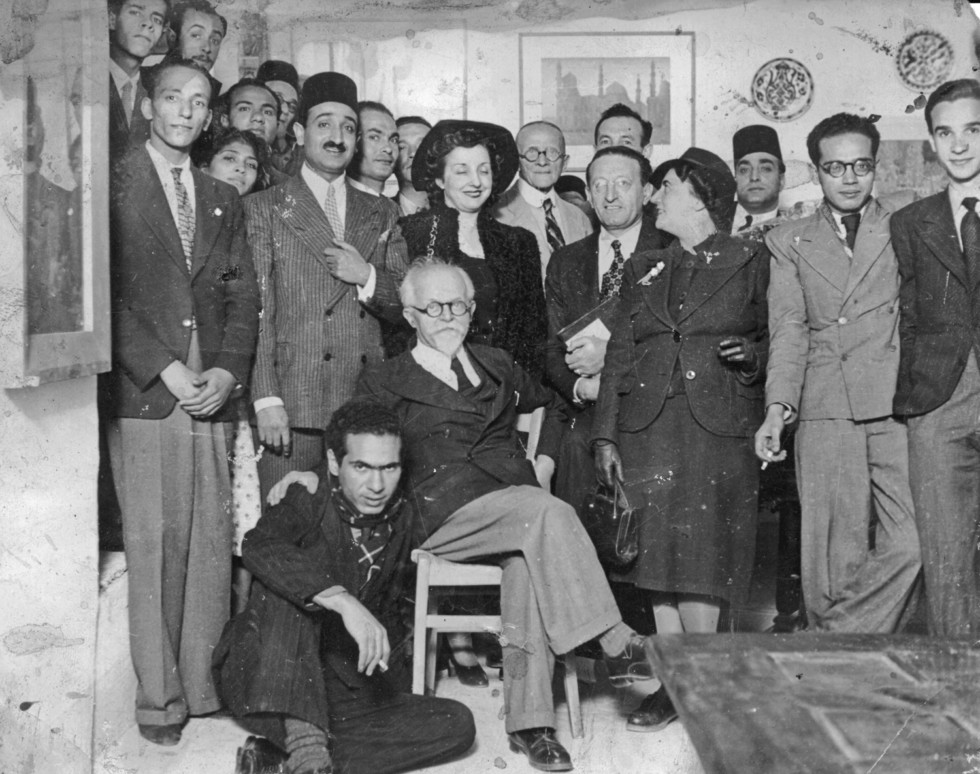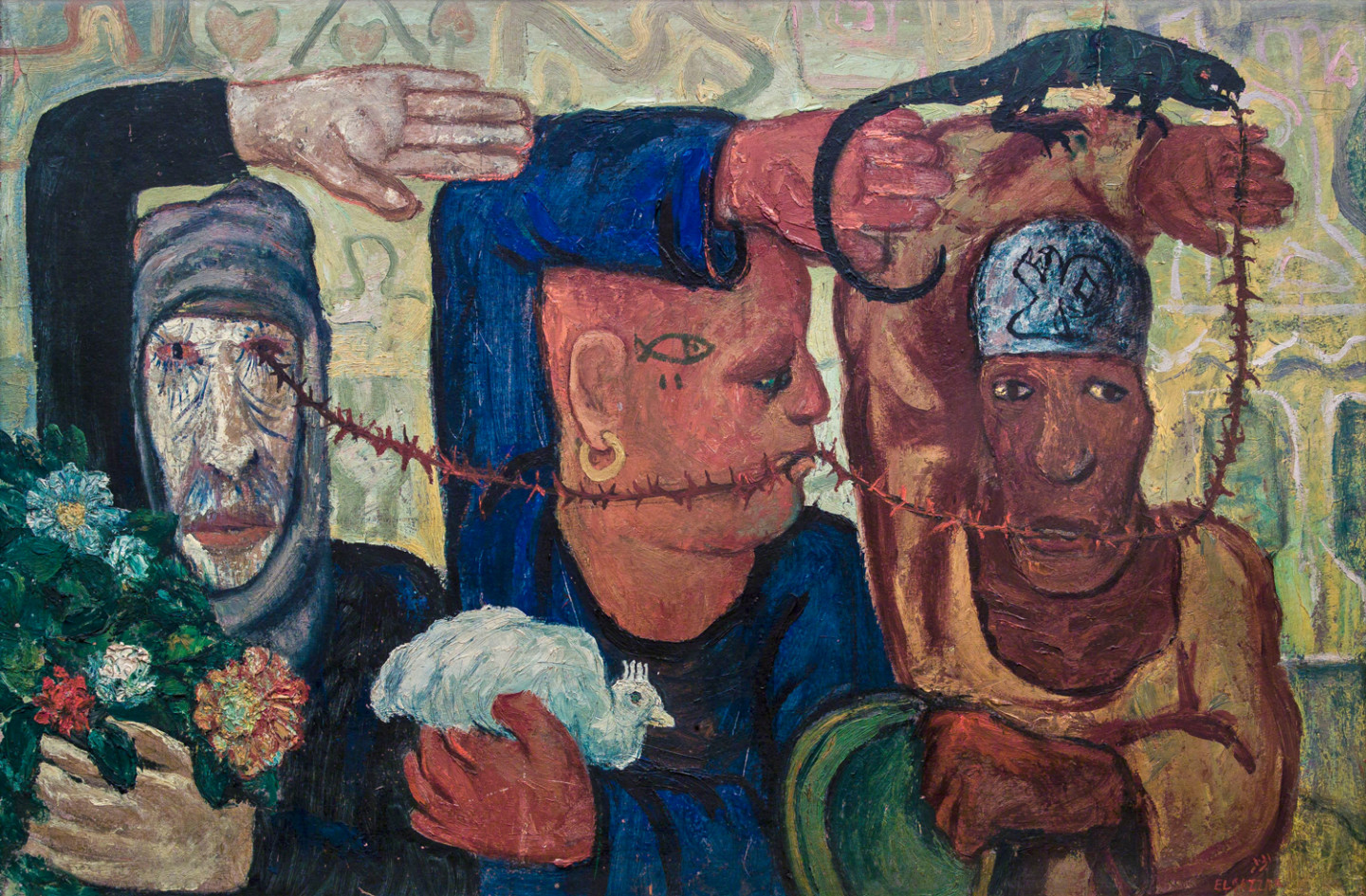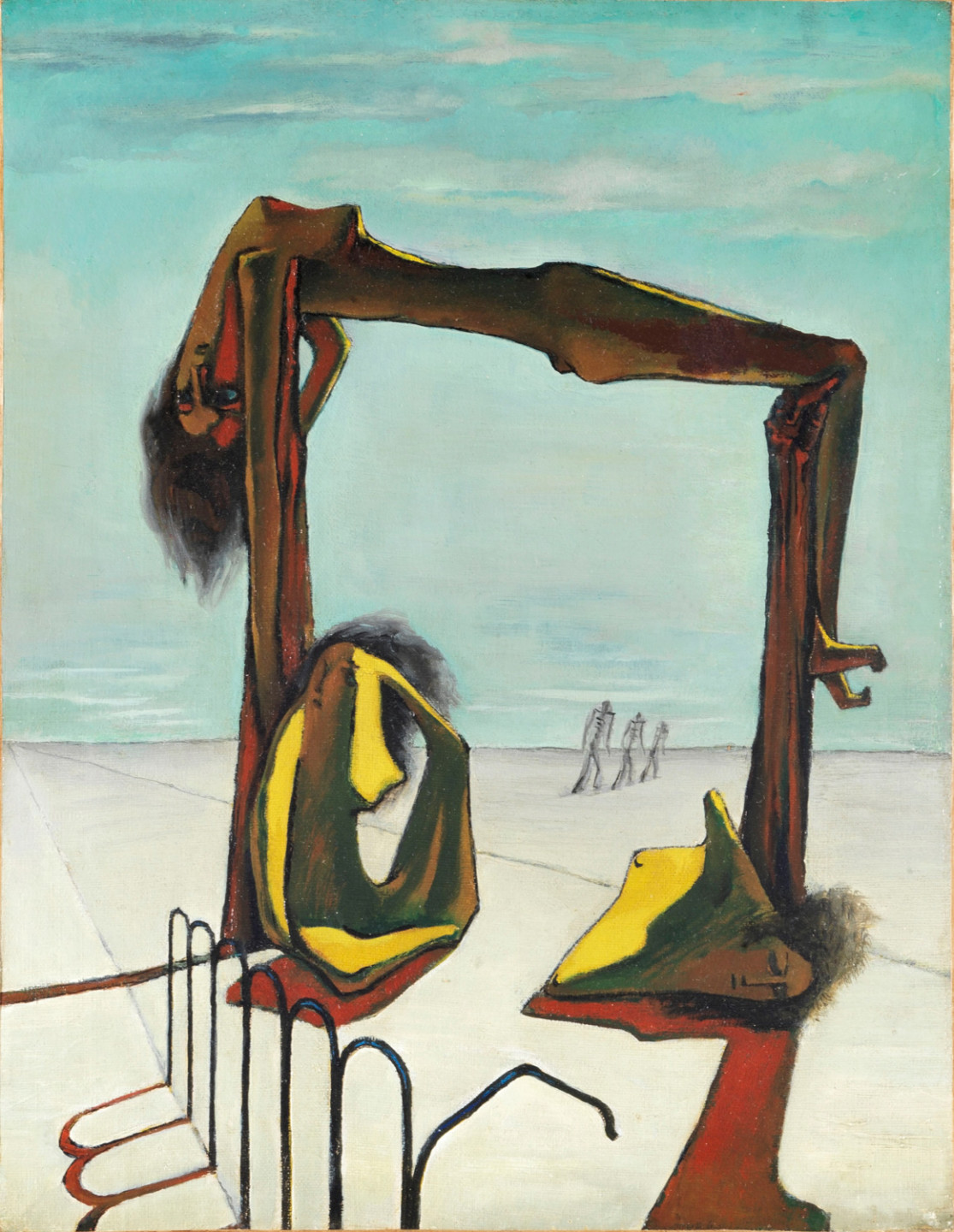by Farida Makar (St. Anthony’s College, Oxford)
In November 2017, Guardian columnist and art critic Johnathan Jones wrote a strident critique of the “Surrealism in Egypt: Art et Liberté” exhibition which had just opened at the Tate Liverpool. “There are lots of mildly diverting paintings of nudes, skeletons and strange desert plants” Jones writes, “yet there is no great artist in this show and no evidence the Egyptian wing of surrealism added anything essential to an international movement that was already waning by the 40s.” Jones’ main contention with the exhibition was the ‘inauthenticity’ of the Egyptian ‘wing’ of surrealism coupled with a reproach for having adopted surrealism ‘after the fact’ or when it was already out of fashion in Paris: “Why should we look at second-rate imitations of a modern French style when we could be contemplating a majestically beautiful minbar carved in Cairo in the 15th century?”

Art et Liberté group, c. 1945 Christophe Bouleau Collection, via Moderna Museet
The piece was met with contestation – most notably by Cairo-based artist and art historian Mehri Khalil, whose response in Jadaliyya, “Can the Subaltern Finally Speak?” brought forward some of the biases, generalizations and inaccuracies in Jones’ review: “Gazing at a minbar fits in the exoticism of Egypt—bringing to mind examples of nineteenth and early twentieth-century Orientalist paintings—whereas surrealism surely does not. With just a few words, Jones deprives Egyptians from the right to freely explore art.” (Khalil, 2017)

Abdel Hadi El-Gazzar, Mahasseb Il-Sayyidah (The beloved of Sayyidah), ca 1950 © Abdel Hadi El-Gazzar, via Moderna Museet (Stockholm)
The Jones-Khalil debate is emblematic of the intellectual conundrums faced by modern historians of anywhere but Europe/North America, especially in the field of intellectual history. How can we make sense of phenomena that are normally considered as part of European/Western traditions when they emerge in different geographies? (Think not just of surrealism or art deco, but also concepts such as ‘culture’, ‘democracy’, ‘revolution’, or ‘the economy’.) Relatedly, how does one grapple with ideas and practices when they appear simultaneously across multiple geographies? (The Age of Revolutions?) Finally, how can one do justice to historical actors and their oeuvre without reducing their work to a simulacrum of a purer ‘Western’ original? These are some of the questions we have been trying to answer through the Political Economy and Culture reading group. I will present here some reflections on both the uses and the limits of different explanatory models for answering these questions, drawing on my own work on the history of educational thought in early 20th century Egypt.

Ramses Younane, Untitled, 1939 Courtesy H. E. Sh. Hassan M. A. Al Thani collection, Doha © Ramses Younane, via Moderna Museet
The most common way to explain the emergence of seemingly “Western” phenomena, whether they be ideational or practical, has been through grand-narrative explanations such as the centre-periphery model. Such explanations maintain that modernization, high culture, and capitalism emerged in the West – the colonial metropole – and were transferred, often in a diffusionist manner, to the non-West, the periphery. (Wallerstein, Decdeli, and Kasaba, 1987) Such models are often couched in materialist terms, regarding the rise of capitalism as a transformative force which not only alters the material conditions of the periphery by bringing it within the economic orbit of the centre, but that also acts as an accelerator of particular alienating labour conditions. It is these features which give rise to similar notions of culture, civilization and high culture across various geographies. (Sartori, 2008) Less materialist versions of the model assume cultural values, such as Weber’s Protestant ethic, to be at the origin of cultural transfers around the world. Centre-periphery models do not necessarily deny the specificity of the non-Western iteration of any given phenomenon. In fact, quite often, they show the ways in which ideas ‘transferred’ from the metropole are actively altered, recycled, re-interpreted and worked with to produce new meanings in the periphery. Following this line of reasoning into my own research, any attempt to explain why Egyptian educators adopted progressive education in the early 20th century would include capitalism, imperialism and liberalism, which were at the heart of Egypt’s colonial experience.
Centre-periphery, diffusionist models of this kind are useful in their emphasis on power asymmetries between the West and non-West, and in their ability to provide a compelling causal explanation of why similar phenomena appeared across diverse geographies. Yet because of their inability to capture the intricacies of cultural exchange, their Eurocentrism, their inability to move beyond national blocs and borders or to problematize the category of ‘the West’ itself, these models have been repeatedly challenged, especially in the past thirty years. In their attempt to ‘provincialize Europe’ and to critique the concept of the ‘waiting room of history’, newer accounts try to turn West-centred diffusionism on its head by highlighting networks of connections, transnationality and exchange (Chakrabarty, 2009). More importantly, they represent an attempt to ‘give back’ agency to actors in non-Western contexts rather than view them as either co-opted agents or victims of structural forces of diffusionism.
Peter Hill’s contribution to this blog series visually demonstrates the difference between these two approaches. While grand-narrative frameworks can be visualized as blocs, the transnational turn of the 2000s emphasises networks, transnationality and interconnectivity across different geographies. This latter approach foregrounds entanglement, shared history or histoire croisée, circulation, and ideational and practical connections between seemingly diverse spaces. (Fuchs et al, 2014; Droux and Hofstetter, 2018; Fuchs and Roldán Vera, 2019; Popkewitz, 2013) By interrogating the relationship between specific individual actors or the influence of practices in the non-West on the West, the ‘transnational turn’ signals fluidity, flow, and constant exchange – at the risk of obfuscating the hegemony of ‘the West’. The most common example from the history of education is the Lancaster monitorial schooling system, developed by Joseph Lancaster in 19th-century England. Grand-narrative explanations for this system would regard its emergence in different parts of the world as a classic case of colonial ‘transfer’: due to capitalism, colonialism and the need to produce obedient and productive citizens, the Lancaster system was adopted from England in various colonial ‘peripheries’. By contrast, a more ‘transnational’ network-based approach can easily demonstrate that this is actually a classic case of “reverse flow”. The monitorial system in fact spread from India to England as British officials were inspired by the madras schooling system they encountered overseas. (Bhattacharya, 2014; Deer, 2005)
Critics of the transnational network approach will note that it is often short of explanatory power. While it can identify how phenomena and ideas circulate, it fails to explain why they do so. Transnational approaches will often zoom in on a handful of individuals or their works rather than focus on larger structural issues. In parallel, post-colonial assessments, which are often equally committed to interrogating Western hegemony, do not necessarily furnish more compelling approaches. As Yoav di Capua’s latest work on Arab existentialism and Jean Paul Sartre argues, “postcolonial studies powerfully uncovers tacit modes of domination” but “ it has done little to date by way of presenting a systematic and comprehensive account of how people on the ground put their thoughts together during the period of decolonization.” (Di Capua, 2018) In other words, approaches that are most concerned with ‘giving back’ agency often falter in this very domain.
I would like to propose a third perspective that can help overcome some of the shortcomings of both approaches, based on reflections upon my own work on the history of pedagogical thought in early 20th century Egypt. More specifically, I would like to put forward the hypothesis that the rise of institutions – such as the university – across different geographies, complicates power asymmetries and problematizes hegemony, while conceding that grand-narrative forces may be at play.
While transnational network approaches often focus on a small number of individuals and their exchanges, they don’t necessarily explain why certain ideas gain traction or why particular individuals adopt one idea over another. The pedagogues I focus on, for example, were engaged in transnational exchanges with their peers in Europe, Turkey, Iraq and the United States. They were highly versed in the latest cutting-edge child-centred practices that were fashionable worldwide, and were part of international networks of progressive pedagogues. The Egypt-based association which was set up to promote progressive education in the interwar period, “rabitat al-tarbiya al-haditha” (The Association for New Education), included non-Egyptian scholars of child psychology such as Constance Bloor, whose books on children’s temperament were widely read. This suggests that we can indeed understand these pedagogues as transnational actors. Yet situating them within a transnational context neither explains why most of them chose progressive education over the increasingly popular fascist and ultra-nationalist models of education of the interwar period; nor does it explain why they chose to actively engage with progressivism to begin with. Indeed, a closer look at teachers’ magazines and the press suggests Egyptian pedagogues were unreservedly critical of Nazi Germany, viewing it as a dictatorship mired in “hero-worship”; many of them decried their pedagogical methods in which “people became soldiers, were stripped of intellectual freedom, as their rulers thought for them.” (Salmoni, 2002). But why was this the case?
This is where an institutionally conscious approach focusing on the university can come in.
With the spread of institutions of higher learning, such as teacher training colleges and university departments, ideas could be explored, written and produced on a wider scale for their own sake within a relatively free environment driven by intellectual curiosity.
This is not necessarily to romanticize the academy or to regard it as unproblematic space outside of the clutches of capital, westernization or liberalism. It is rather an attempt to focus on the institutional scaffolding that universities provide for the creation of exchanges that are inherently different from the individual, small-scale entanglements foregrounded in transnational approaches. Universities and academic departments can create a distinctive space in which a large number of individuals can commit themselves to an intellectual project, can teach, write, research and engage with peers elsewhere on equal footing. The university accounts for both the multi-directionality of knowledge production and the larger grand-narrative structures at play: the institutionalized environment enables individuals to push back against structural forces.
The Egyptian pedagogues I research were all affiliated with three main teacher training institutions between 1922 and 1956. Through such affiliations, and the academic positions they occupied, they collectively authored over 40 books on child psychology and education, organized academic conferences, lectured thousands of students, studied abroad and published studies in reputed international (Western) journals (Koussy, 1935). Their debates often featured in a specialized press in Egypt, and they were solicited by the Ministry of Education to weigh in on important policy issues. They also collaborated with academics from across the region – most notably Iraq – to produce a vibrant and unique tradition of progressive education based on a distinct understanding of child psychology which was extremely aware of the contradictions inherent to the discipline.
Thanks to the opportunities provided by this institutional framework, Egyptian pedagogues were able to explore progressive education and the debates surrounding it relatively freely. That is, they could entertain ideas that came from all sides of the political spectrum and debate their efficacy, their appeal, and their moral weight. For instance, student magazines published by one of famous teacher training colleges, ‘ma‘had al-tarbiya’, often featured articles on the merits of free schools as well as the potential benefits of adopting Germany style ultra-nationalist education. Institutions such as ma‘had al-tarbiya developed ‘experimental classrooms’ in which young teachers could test out teaching methods on the ground, review their methodologies, and theorize them. Ultimately, progressive education, with its reliance on independent thought, critical thinking and its experimental nature, seemed to be a lot more appealing for most educators. In other words, one of the reasons they adopted progressive education is because it was an intellectually stimulating and interesting school of thought, one which awarded them engaging debates and allowed them to produce knowledge and ‘flex’ their intellectual muscles. It was a far cry from dogmatic practices that forced teachers to inspect and drill students. More importantly, through institutions such as ma ‘had al-tarbiya teachers developed the tools to create their own teaching practices: they were exposed to various theories and given opportunities to put these to the test, allowing them to actively chart their educational practice. A focus on institutions rather than individuals or loose networks provides a framework which intersects between grand-narratives and transnational network theories. It allows us to move beyond this dichotomy by exploring ways in which asymmetrical power relations can be challenged without necessarily being diluted. Whether the discussion revolves around art deco, existentialism, progressive education, or surrealist art, it may be helpful to focus on the academic and institutional frameworks within which these ideas are expressed. The institutional level offers the possibility of balancing grand structural theories against individual connections – all while respecting the commitment and seriousness of our historical interlocutors.
Bibliography
*Bagchi, Barnita, Eckhardt Fuchs, and Kate Rousmaniere. Connecting Histories of Education: Transnational and Cross-Cultural Exchanges in (Post-)Colonial Education. New York: Berghahn Books, 2014.
*Caruso, Marcelo. “Within, between, above, and beyond: (Pre)Positions for a History of the Internationalisation of Educational Practices and Knowledge.” Paedagogica Historica 50, no. 1–2 (2014): 10–26.
*Chakrabarty, Dipesh. Provincializing Europe: Postcolonial Thought and Historical Difference. Princeton, NJ: Princeton University Press, 2009.
*Di-Capua, Yoav. No Exit: Arab Existentialism, Jean-Paul Sartre, and Decolonization. Chicago: University of Chicago Press, 2018.
*Droux, Joëlle, and Rita Hofstetter, eds. Border-Crossing in Education: Historical Perspectives on Transnational Connections and Circulations. Place of publication not identified: Routledge, 2018.
* “Going International: The History of Education Stepping beyond Borders.” Paedagogica Historica 50, no. 1–2 (2014): 1–9.
*Fuchs, Eckhardt, and Eugenia Roldán Vera. The Transnational in the History of Education: Concepts and Perspectives. Global Histories of Education. Cham: Palgrave Macmillan, 2019.
*Haupt, Heinz-Gerhard. “Une nouvelle sensibilité: la perspective transnationale.” Cahiers Jaurès N 200, no. 2 (2011): 173–180.
*Jones, Jonathan. “Was There More to Egyptian Surrealism than Suggestive Mosques and Rotten Meat?” The Guardian. November 27, 2017. https://www.theguardian.com/artanddesign/2017/nov/27/surrealism-in-egypt-tate-liverpool.
*Khalil, Mehri. “Can the Subaltern Finally Speak.” Jadaliyya, December 21, 2017, https://www.jadaliyya.com/Details/34893.
*Koussy, ’Abd al-’Aziz al-. An Investigation into the Factors in Tests Involving the Visual Perception of Space. British Journal of Psychology. Monograph Supplements ; 20. Cambridge: Cambridge University Press, 1935.
*Moyn, Samuel, and Andrew Sartori. Global Intellectual History. New York: New York University Press, 2015.
*Popkewitz, Thomas S, ed. Inventing the Modern Self and John Dewey: Modernities and the Traveling of Pragmatism in Education. Ebook Central. New York: Palgrave Macmillan, 2005.
*Popkewitz, Thomas S., ed. Rethinking the History of Education: Transnational Perspectives on Its Questions, Methods, and Knowledge. Basingstoke: Palgrave Macmillan, 2013.
*Salmoni, Barak A. “Pedagogies of Patriotism: Teaching Socio -Political Community in Twentieth-Century Turkish and Egyptian Education.” PhD diss., Harvard University, 2002.
*Sartori, Andrew. Bengal in Global Concept History: Culturalism in the Age of Capital [Electronic Resource]. Chicago Studies in Practices of Meaning. Chicago, [Illinois] ; London, [England, 2008.
*Sobe, Noah W. “Balkanizing John Dewey.” In Inventing the Modern Self and John Dewey: Modernities and the Traveling of Pragmatism in Education, edited by Thomas S Popkewitz. Ebook Central. New York: Palgrave Macmillan, 2005.
*“Entanglement and Transnationalism in the History of American Education.” In Rethinking the History of Education: Transnational Perspectives on Its Questions, Methods, and Knowledge, edited by Thomas S. Popkewitz. Basingstoke: Palgrave Macmillan, 2013.
*Subrahmanyam, Sanjay. “Global intellectual history beyond Hegel and Marx”. History and Theory 54, no. 1 (2015): 126–137.
*Wallerstein, Immanuel, Hale Decdeli, and Resat Kasaba. 1987. ‘The Incorporation of the Ottoman Empire in the World-Economy.’ In The Ottoman Empire and the World-Economy, edited by Huri Islamogu-Inan, 88–97. Cambridge: Cambridge University Press.
*Wilson, Jon E. “Taking Europe for Granted (Book Review).” History Workshop Journal, no. 52 (2001): 287–295.
